A flurry of actions have been undertaken recently to help Israel, to assist Donald Trump’s electoral prospects… and, if Trump is defeated, to procure the policies before a possibly less hardcore pro-Israel candidate takes office…
By Alison Weir
As polls continue to show Biden leading over Trump, Israel partisans have been undertaking a slew of actions that benefit Israel. The recent flurry of activity likely has two motivations:
(1) To help Trump get elected by increasing his support among pro-Israel donors and voters.
(2) To procure pro-Israel objectives while it’s still possible, in case Trump is defeated by a candidate who some Israel partisans worry may be less influenced by the pro-Israel right, whose actions have sometimes displeased hardcore Israel advocates, and whose party members increasingly support Palestinian rights.
While both Trump and Biden have long pandered to Israel partisans and are largely beholden to pro-Israel campaign donors, Trump donors like Sheldon Adelson are often more extreme in their demands.
As a result, the Trump administration has taken actions eschewed by previous administrations from both parties, including moving the US embassy to Jerusalem, recognizing Israel’s annexation of Syria’s Golan Heights as supposedly legitimate, cutting off aid to Palestinians, and shutting down the Palestinian office in Washington.
Although it is true that previous administrations have also undertaken numerous pro-Israel actions, the Trump administration has consistently gone further and been more influenced by the extremist portion of the Israel lobby.
One example is that while previous US teams put in charge of trying to broker Israel-Palestine peace largely consisted of Israel partisans who acted as “Israel’s lawyer,” they were in favor of a “two state solution” and largely felt that the expansion of settlements was bad for Israel.
The current “peace team,” on the other hand, has consisted of right wing Israel partisans with ties to the Israeli settlement movement who believe Israel should annex all Palestinian land.
The Jewish Telegraphic Agency (JTA) reports that the team “has made Israel’s interests paramount in its strategies.” Its members are “cut from the same religious and ideological cloth.” They are committed to “greater Israel,” the belief that the West Bank and Gaza are allegedly Jewish land, which precludes a ‘two-state solution.’
JTA states that peace team members Jared Kushner, Jonathan Greenblatt, David Friedman, and Avraham “Avi” Berkowitz “were all raised in Orthodox Jewish homes, are all from the New York area, and all have deep pre-government ties to Israel and its religious institutions.”
There is no doubt that Biden is also in thrall to the Israel lobby and to neocon hawks (the latter are now endorsing him just as they did Hillary). However, Biden’s absolute fealty to Israel is less certain than Trump’s, and the progressives in his party could circumscribe Biden’s actions, so it appears that the administration’s Israelists are grabbing what they can now so that no matter what happens in the upcoming election, Israel has benefited.
Recent pro-Israel accomplishments
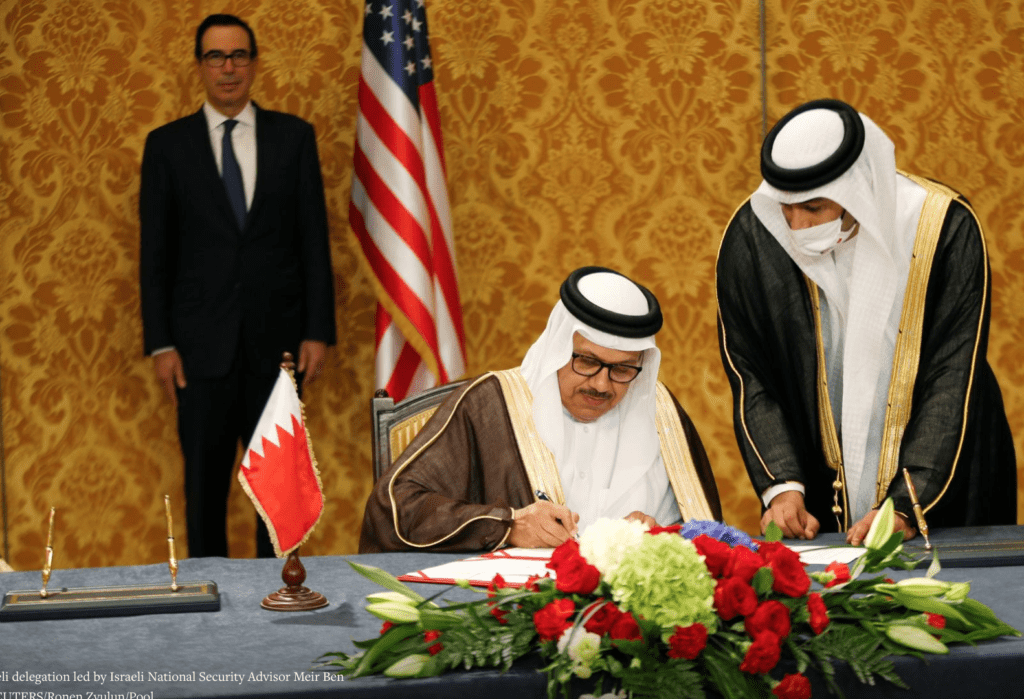
Pushing Arab countries to “normalize” relations with Israel
In recent months the Trump administration has successfully induced several Arab countries to abandon the decades-long boycott of Israel that had been put in place after Israel invaded and began occupying the West Bank and Gaza.
For many years only Egypt and Jordan (in exchange for massive US aid money) had agreed to diplomatic relations with Israel. Other Arab countries had said they would establish ties with Israel only after Israel’s withdrawal from the West Bank and Gaza and the establishment of an independent Palestinian state.
Overcoming this opposition has long been a major goal for Israel and its partisans, and now it has begun to happen, thanks to Trump officials.
The Times of Israel reports: “The recent normalization pacts with Israel have undermined the traditional Arab consensus that there can be no normalization with Israel before the establishment of an independent Palestinian state.”
US Ambassador to Israel David Friedman told an Israeli newspaper that the plan has been to put “all our efforts in the near future in diplomatic efforts” to “make Israel safe, secure and prosperous” by encouraging more countries to normalize ties with Israel.
Formerly Trump’s bankruptcy lawyer, Friedman is known as a pro-Israel extremist. The Center for Constitutional Rights reports: “Friedman funnels millions of tax-deductible U.S. dollars to facilitate Israel’s illegal settlement enterprise, supports Israeli annexation of the West Bank, denies the existence of Palestinian rights to Jerusalem, and zealously attacks anyone who takes issue with his far-right agenda. More than 600 U.S.-based rabbis and cantors have signed a letter opposing Friedman’s appointment.
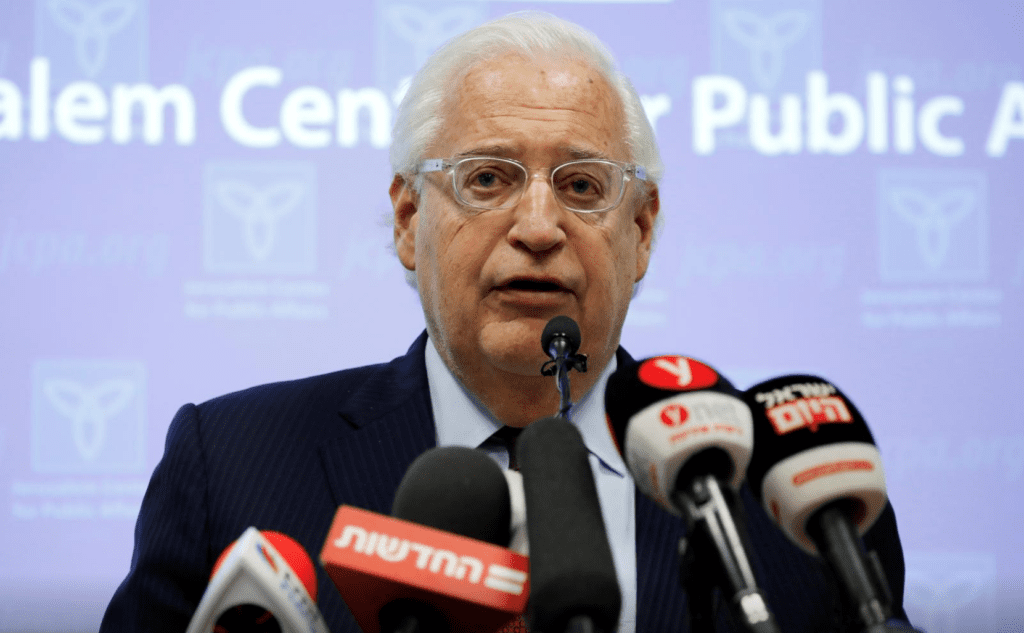
At first some Arab leaders resisted the pressure to sign public accords with Israel before any of their’ objectives on behalf of justice for Palestinians had been attained. As Al Jazeera reported:
Bahrain’s king has told visiting US Secretary of State Mike Pompeo that the Gulf state is committed to the creation of a Palestinian state, according to state media, in an implicit rejection of Washington’s push for Arab countries to swiftly normalise ties with Israel.
Before Bahrain, Pompeo was in Sudan where Prime Minister Abdalla Hamdok said on Tuesday his transitional government has “no mandate” to take the step of establishing relations with Israel.
And on Wednesday, Bahrain echoed the sentiments of its ally and regional heavyweight Saudi Arabia that accord with Israel would not materialise without the establishment of an independent Palestinian state.
According to the official Bahrain News Agency, King Hamad bin Isa Al Khalifa told Pompeo his country remains committed to the Arab Peace Initiative – which calls for Israel’s complete withdrawal from the Palestinian territories occupied after 1967, in exchange for peace and the full normalisation of relations.
“The king stressed the importance of intensifying efforts to end the Palestinian-Israeli conflict according to the two-state solution … to the establishment of an independent Palestinian state with East Jerusalem as its capital,” the agency reported.
Eventually, however, some Arab leaders caved in to US pressure and inducements and signed normalization agreements. The UAE led the way in August.
* United Arab Emirates (UAE). August 13,2020. There seems to have been a strong inducement to procure the agreement; behind the scenes, the UAE was told it would be permitted to buy American F-35s and other military weaponry.
As an official at the Washington Institute for Near East Policy (an AIPAC cutout) said, the deal was “a win for the Emirates, which will undoubtedly be eligible for military sales” that it would not normally be able to obtain.
Israeli Prime Minister Netanyahu was jubilant about the US brokered agreement: “Everyone can see the fruits of this peace accord. The UAE committed to bringing massive investments to Israel, hundreds of millions of shekels. It’s already happening and it will happen even more.”
* Bahrain: September 2020. Efforts to achieve this agreement had been openly underway since at least 2019, when several American Jewish Committee delegations visited the country, giving Bahrain the “Architect of Peace” award for reportedly being “opening and welcoming” towards the Israel lobby group.
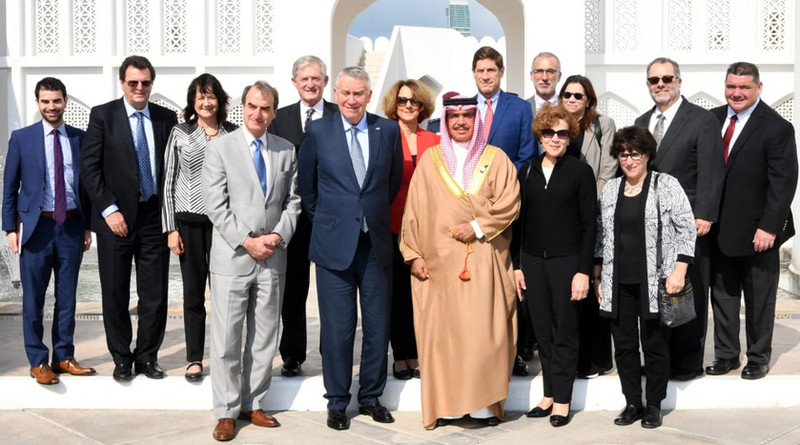
Trump son-in-law and Senior White House adviser Jared Kushner hailed the agreement as “the culmination of four years of great work” by the Trump administration.
Avi Berkowitz, U.S. Special Representative for International Negotiations, said at the signing: “We’re in negotiations with many other countries. I unfortunately can’t specify yet which countries.”
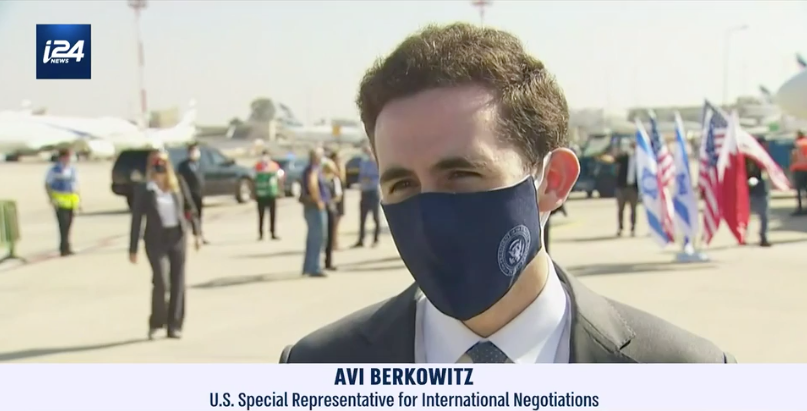
Berkowitz reportedly attained his position because of his long friendship and idealogical kinship with Jared Kushner. Berkowitz studied at a fundamentalist religious school in Israel for two years. He is said to have been “an integral member of this team since the beginning. He’s been to all of the trips overseas and in all the meetings, in a high-level capacity developing the administration’s plan.”
Al Jazeera reports that for years Palestinians saw the US as Israel’s lawyer or partner. “Now they see it as Israel’s agent.”
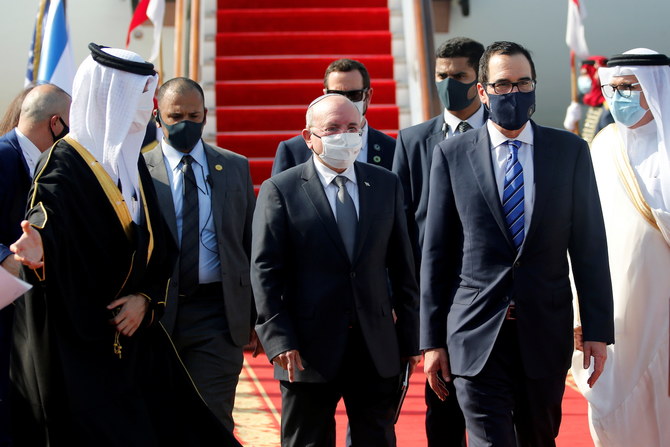
* Sudan October 23, 2020 – A Sudanese official revealed that “normalizing relations with Israel was one of the conditions set by the U.S. government to remove Sudan from its list of countries that sponsor terrorism.”
AP reports: “Getting off the list is a key incentive for the Sudanese government to establish official ties with Israel. It would open the door for Sudan to get international loans and aid needed to revive its battered economy and rescue the country’s transition to democracy.”
A senior Sudanese official, the New York Times reports, said that the government “had bowed to months of American pressure over Israel, despite fears of a domestic backlash, in return for Sudan’s removal from an American list of state sponsors of terrorism.”
The U.S. had designated Sudan a state sponsor of terrorism in 1993 for its support of anti-Israel resistance groups Hamas and Hezbollah.
According to AP: “While Sudan does not have the influence or wealth of the Gulf Arab countries, a deal with the African country would be deeply significant for Israel.”
“Netanyahu has made it a priority to forge ties with formerly hostile countries in Africa and the Arab world in the absence of any progress with the Palestinians during his more than decade in office,” AP states. “Netanyahu believes that outside pressure could force the Palestinians into abandoning their traditional demands for a state in all of the West Bank, Gaza Strip and east Jerusalem — lands Israel captured in 1967.”
The move may also have helped Trump shore up support from some evangelical Christian and Jewish voters, as Trump suggested that Biden would never have accomplished it.
Changing US laws for Israel
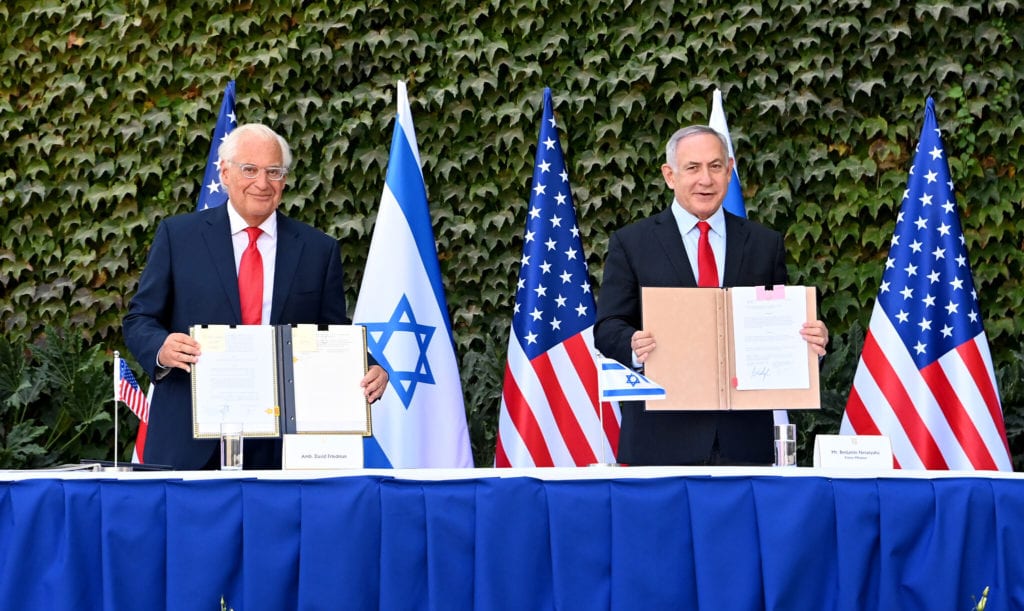
* Amended a series of scientific cooperation agreements to include Israeli institutions in the West Bank, which Israeli media see as “as precursor to future West Bank annexation.”
Netanyahu hailed the agreements as “an important victory.”
According to AP, the move “further blurs the status of settlements widely considered illegal under international law. Until now, three U.S.-Israeli science cooperation agreements excluded projects in areas captured by Israel in the 1967 Mideast war — including the West Bank, east Jerusalem and the Golan Heights.”
The agreement was signed by David Friedman and Netanyahu in a ceremony at Ariel University, located within an Israeli settlement in the heart of the West Bank.
Friedman told the Times of Israel that he had initiated the removal of the “offending clause” (preventing funding projects in illegal settlements) from the agreement a year ago and that it involved “a complicated interagency process.”
The projects have reportedly provided more than $1.4 billion to over 7,300 projects in Israel.
* Gave U.S. passport holders who were born in Jerusalem the option of having Israel listed as the country, reversing decades of U.S. policy.
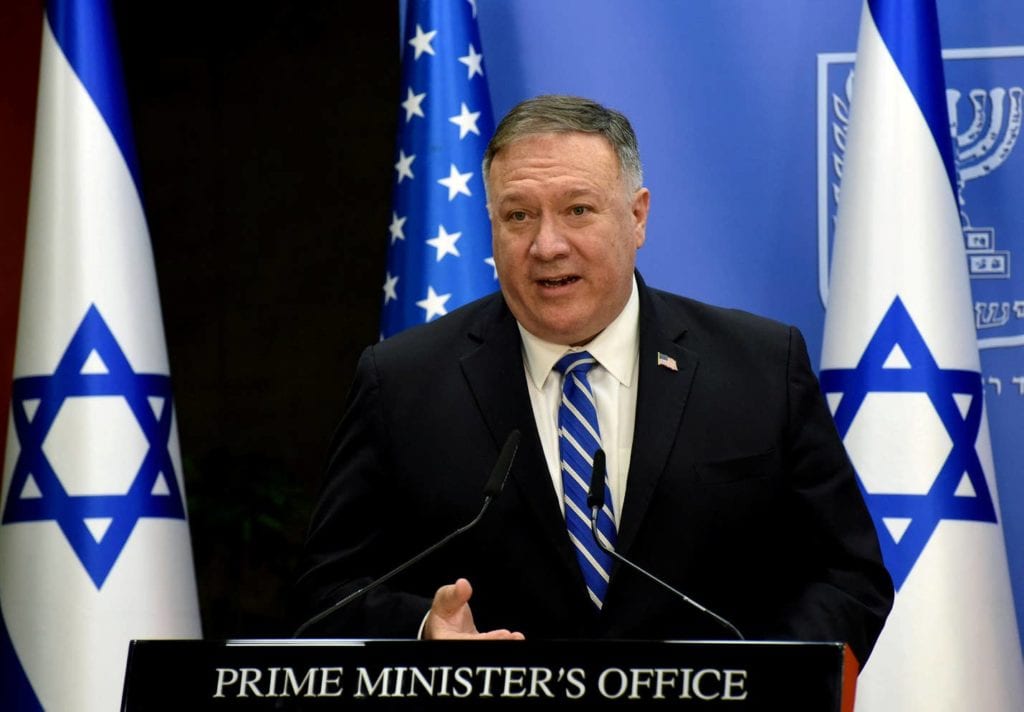
Politico reports: “American passports have not used the phrase ‘Jerusalem, Israel’ because the exact status of the city has long been disputed as part of the Israeli-Palestinian conflict. Prior to Trump, U.S. policy had been that the city’s borders and status are issues subject to negotiations between Israelis and Palestinians. Thus, U.S. passports have simply stated their bearers were born in ‘Jerusalem’.”
The Times of Israel points out that the move “comes amid a flurry of gestures and diplomatic activity seemingly aimed at shoring up pro-Israel Jewish and Evangelical Republican voters, with days to go before the November 3 presidential election.”
Biden differences and similarities
Joe Biden has been close to Israel since at least 1973 and has called himself a “Zionist,” but he differs with the Trump insiders on some aspects of the issue. JTA synopsizes his views:
Biden has said that he hopes to maintain a robust relationship with Israel as president, although he differs sharply from President Donald Trump in some areas: Biden would return to the Iran nuclear deal, albeit under what he says would be stricter terms limiting Iran’s nuclear capabilities. He would uphold the two-state solution and would reject the portions of Trump’s peace proposal that would allow Israel to annex West Bank territory, although he would not condition aid to Israel over compliance with U.S. policy.
One facet of Trump’s Middle East policy Biden has welcomed is the recent proliferation of normalization agreements between Israel and the United Arab Emirates, Bahrain and Sudan.
Israel partisans in Congress have also been busy

Jewish Insider reports: “Reps. Josh Gottheimer (D-NJ) and Brian Mast (R-FL) are expected to introduce bipartisan legislation this week that would seek to provide Israel with the largest non-nuclear bomb in the U.S. arsenal, with the ability to strike at Iran’s well-protected nuclear facilities, a source familiar with the legislation told Jewish Insider.”
The bill doesn’t appear to be on the Congressional website yet, but Gottheimer states that they introduced it on October 12. The text is here.
A previous JI article reported: “As co-chair of the House Problem Solvers Caucus, Gottheimer invests his time in Washington on bipartisan efforts, including preserving support for Israel in Congress on both sides of the aisle.”
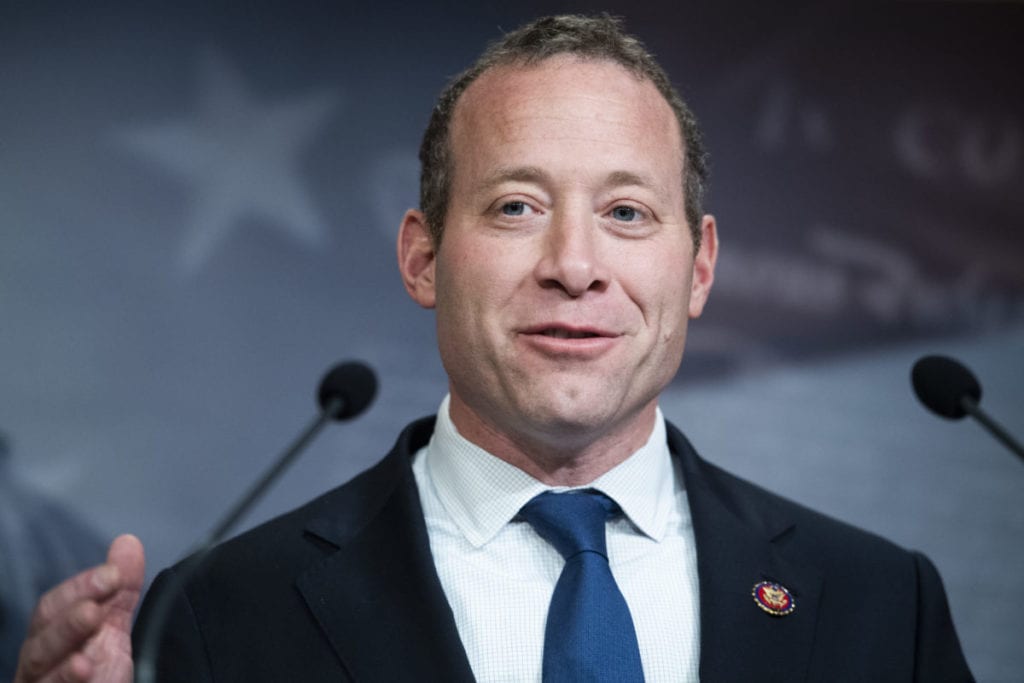

The bill is the latest in over 90 items introduced in the current Congress to benefit Israel. Much of the legislation funnels additional money to Israel above the more than $3.8 billion it already receives annually. See details here (including scoreboards of Congress members’ actions on Israel-Palestine).
Alison Weir is executive director of If Americans Knew, president of the Council for the National Interest, and author of Against Our Better Judgment: The Hidden History of How the U.S. Was Used to Create Israel.
Our operations are funded solely by generous individuals like you. Your contribution will help us continue shining a light on the Israel/Palestine situation and the U.S. connection.
DONATERELATED:
- WATCH: Pro-Israel groups air ads for Trump & Biden
- Trump-Kushner “Peace” Plan ignores elephants in the room: Israel created this mess
- Adelson to donate $100 million to Trump & Repubs, fundraisers say
- Analyses of Trump’s Peace Plan for Israel-Palestine, “Deal of the Century”
- “Alternative facts” abound in Trump’s Israeli-American Council speech
- 38 billion reasons to vote for Joe Biden – If you’re Israeli
- Watch: Daily life in Palestine
- IAK videos on Palestinian deaths
- Congressional scoreboards on all Israel-Palestine legislation
- Trump Approves Selling F-22 Raptor to Israel





